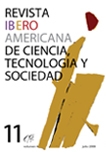The Cultures of the Internet
The Socio-Technical Configuration of the Network of Networks
DOI:
https://doi.org/10.52712/issn.1850-0013-899Keywords:
determinism, information society, scientific culture, hacker cultureAbstract
Most accounts of the interaction between the Internet and society follow the usual scheme of impact analysis and thus a deterministic point of view. They try to identify the transformations, changes and impacts that the use of the Internet is causing in different social contexts. However, few studies do take the reverse direction: the analysis of social or cultural factors shaping, not only the use, but the very design of the network of networks. The aim of this paper is precisely to explore which particular cultures have shaped the Internet as we know it, and to establish links between them and some of the basic structural and functional features of the network. Contributions coming out of the scientific and the hacker communities are specifically analysed.
Downloads
References
ABBATE, Janet (1999): Inventing the Internet, Cambridge, MA, MIT Press.
AIBAR, Eduard (1995): “Technological Frames in a Town Planning Controversy: Wy we do not have to drop Constructivism to avoit Political Abstinence”, en C. Mitcham (ed.): Social and Philosophical Constructions of Technology. Research in Philosophy and Technology, Vol. 15, Greenwich, Jai Press, pp. 3-20.
AIBAR, Eduard (1996): “La vida social de las máquinas: orígenes, desarrollo y perspectivas actuales en la sociología de la tecnología”, Reis, nº 76, pp. 141-170.
AIBAR, Eduard y QUINTANILLA, Miguel Ángel (2002): Cultura tecnológica. Estudios de ciencia, tecnología y sociedad, Barcleona, Horsori.
AIBAR, Eduard y URGELL, Ferran (2007): Estado, burocracia y red. Administración electrónica y cambio organizativo, Barcelona, Ariel.
BELL, Daniel (1976): El advenimiento de una sociedad postindustrial, Madrid, Alianza.
BIJKER, Wiebe (1995): On Bicycles, bakelite, and Bulbs. Elements for a Theory of Socio-Technical Change, Cambridge, MA, MIT Press.
CALLON, Michel (1986): “Some Elements of a Sociology of Translation: Domestication of the scallops and the Fishermen of St. Brieuc Bay”, en J. Law (ed.): Power, Action, and Belief: A New Sociology of Knowledge, Londres, Routledge & Kegan Paul.
CASTELLS, Manuel (1997): La era de la información (trilogia), Madrid, Alianza.
CASTELLS, Manuel (2002): La galaxia Internet. Reflexiones sobre Internet, empresa y sociedad, Barcelona, Plaza y Janés.
FISHER, Claude Serge (1992): America Calling. A Social History of the Telephone in the USA, Berkeley, University of California Press.
HACKETT, Edward John, AMSTERDAMSKA, Olga, LYNCH, Michael y WAJCMAN, Judy (2008): The Handbook of Science and Technology Studies, Cambridge, MA, MIT Press.
HARDT, Michael y NEGRI, Antonio (2004): Multitud. Guerra y democracia en la era del Imperio, Barcelona, Debate.
KLING, Rob (1991): “Computerization and Social Transformations”, Science Technology and Human Values, vol. 16(3), pp. 342-367.
LATOUR, Bruno (1992): Ciencia en acción, Barcelona, Labor.
OGBURN, William (1933): Living with Machines, Chicago, American Library Association.
POSTMAN, Neil (1993): Technopoly. The Surrender of Culture to Technology, New York, Alfred A. Knopf.
RAYMOND, Eric Steven (1999): The Cathedral and the Bazaar, California, O’Reilly.
SMITH, Merritt Roe y MARX, Leo (1997): Historia y determinismo tecnológico, Madrid, Alizanza.
SNOW, Charles Percy (1959): The Two Cultures and the Scientific Revolution, New York, Cambridge University Press.
TUOMI, Ilkka (2002): “The Lives and Death of Moore’s Law”, First Monday, vol. 7 (11) Nov.
WILLIAMS, Rosalind (2004): Cultura y cambio tecnológico, Madrid, Alianza.
WINNER, Langdom (1979): Tecnología Autónoma, Barcelona, Gustavo Gili.
WOOLGAR, Steve (2002): Virtual Society? Technology, Cyberbole, Reality, Oxford, Oxford University Press.
Downloads
Published
How to Cite
Issue
Section
License
Copyright (c) 2025 CC Attribution 4.0

This work is licensed under a Creative Commons Attribution 4.0 International License.
All CTS's issues and academic articles are under a CC-BY license.
Since 2007, CTS has provided open and free access to all its contents, including the complete archive of its quarterly edition and the different products presented in its electronic platform. This decision is based on the belief that offering free access to published materials helps to build a greater and better exchange of knowledge.
In turn, for the quarterly edition, CTS allows institutional and thematic repositories, as well as personal web pages, to self-archive articles in their post-print or editorial version, immediately after the publication of the final version of each issue and under the condition that a link to the original source will be incorporated into the self-archive.











